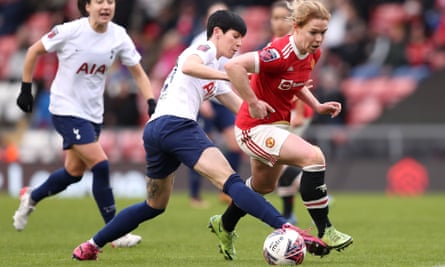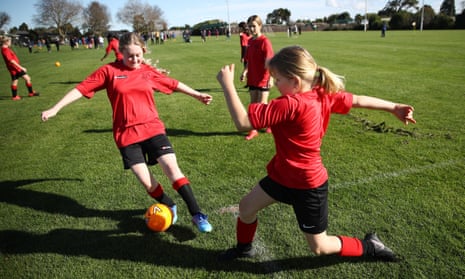Welcome to Moving the Goalposts, the Guardian’s new (and free) women’s football newsletter. Here’s an extract from this week’s edition. To receive the full version once a week, just pop your email in below:
It was at a village fete this summer that Manchester United’s Aoife Mannion saw a stall run by the local Davenham Juniors Football Club. After going over to introduce herself, Mannion – also an England international – discovered that the club were looking to start a new girls’ team, after their last one folded in 2018.
Mannion wanted to help, so she gave talks in two local schools encouraging girls to sign up to the club and, also, to turn on their televisions and watch the Lionesses play at Euro 2022. What happened next, Mannion explains over the phone, was “absolutely not what we expected”. Instead of launching only one team, Davenham Juniors are poised to start three girls’ sides in September.
“I just can’t see that that would have been the case if the Euros hadn’t been in England,” the 26-year-old defender says. “In terms of like a catalyst, and really bringing it to the forefront of people’s minds, I think the Euros has done that perfectly, especially because we won.”
But Davenham Juniors aren’t the only women or girls’ grassroots team seeing a boost in numbers after this year’s record-breaking Euro 2022. Across the UK, grassroots clubs are reporting a boom following the Lionesses’ historic victory.
In nearby Manchester, Ella Toone’s former club Astley & Tyldesley have experienced what Lorraine Warwick-Ellis, their head of women and girls development, can only describe as “the Tooney influence”, adding: “We’ve definitely had an increase in interest from girls. I’d say from ages 13, 14, 15 and below, it’s been a significant increase … in the under-10s age category, that’s just gone off the scale. We’ve now formed two teams at that age group, and we potentially might be forming a third.”
With Northern Ireland making a historic debut at Euro 2022, it’s perhaps unsurprising that a similar trend is being reported there. Lisburn Distillery FC – based in County Down – are gearing up to launch their first girls’ academy, which their coordinator, Donna Maxwell, says is specifically “on the back of the Euros”.
Maxwell says: “Even just from talking to people locally, the push to get girls teams going now is massive. We never thought that we’d see the Northern Ireland team get to such a big competition and it was fantastic to see how well they did.”
On the Football Association’s part, it has set a target to get 7,000 more women and girls regularly playing for grassroots clubs by 2024, with an overall ambition to get 120,000 more girls playing football by the same year. In the same vein, this month the Lionesses wrote a letter demanding the government ensures every schoolgirl is given the opportunity to play football. Currently, only 44% of secondary schools in England offer girls equal access to football, according to the FA.

In Birmingham Yasmin Nessa, project lead at Saltley Stallions Women’s FC, says her club have also seen increased interest since the tournament. “I’ve noticed that the numbers have just increased dramatically over the space of like two weeks,” she says. For Nessa, she hopes the legacy of the tournament will be to show that “women and girls can engage in football, to normalise that and change the standards around it completely, [to] change the conversation”.
Elsewhere, in Ipswich, Kaileigh Bridges has helped Shotley Rangers to form their first girls’ side for the under-nine age group. “With every game that the Lionesses were winning, we would then, as a consequence of that, start getting random Facebook messages with parents who were asking about their girls, if there was something going for their girls to be involved in,” she says. “So it really has had a direct impact on us having a girls’ team.”
Despite this, women and girls’ grassroots clubs often face a mountain of challenges, particularly when it comes to funding, access to facilities, and coaching staff. In Wales, Phil Butler, coach of Newport City Ladies, recently told the National newspaper that more grassroots funding was needed, branding the facilities in south Wales as “atrocious”. Warwick-Ellis, meanwhile, says: “We’re still struggling with female coaches stepping forward, which is a real shame because in the Euros you saw that there were a lot of coaches that were women … I think that really needs to be the next area where we start looking and getting women more involved in it.”
For Manchester United’s Mannion, who is in rehabilitation after an ACL injury, she plans to speak in more schools in support of Davenham Juniors once term restarts. “It’s really heartwarming,” she says. “Originally, I only said that I would nip over to school and speak to them and then be on with my life, basically. But, actually, I just found myself super interested in it. I’ve got involved a lot more because it just gives me a lot of joy to think that there will be lots of girls that will have access and opportunities that, one, they should have, but also that maybe the previous generation didn’t.”
Quote of the week
England’s captain, Leah Williamson, guest edited BBC Radio 4’s Woman’s Hour last week, and thanked Sue Whyatt – who played for England’s first women’s team – in a heartwarming moment: “I stand on your shoulders. Without you, I wouldn’t be where I was and the game certainly wouldn’t be where it is. So, you say thank you to me but, actually, it’s from me to you.”

Recommended viewing
Costa Rica’s captain, Alexandra Pinell, scored a scorcher of a free-kick – from about 40 yards out – as her side took on Australia in the group stages of the Under-20 Women’s World Cup last Wednesday. Australia fought back to win 3-1, but Pinell’s dazzler really stole the show.

Comments (…)
Sign in or create your Guardian account to join the discussion